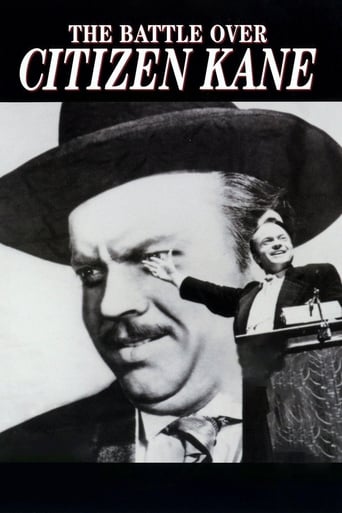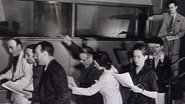gavin6942
Documentary about the battle between Orson Welles and William Randolph Hearst over Welles' "Citizen Kane" (1941). Features interviews with Welles' and Hearst's co-workers also as a relatively complete bio of Hearst.This documentary covers two things. One is the creation of "Citizen Kane" and the troubles that Orson Welles went through to get people to see it. This is covered fairly well, and for a fictional version of the story people can watch "RKO 281" which is based on this documentary.The other part is just as interesting, and maybe even more so: the biography of William Randolph Heart. While a towering figure in his day and at the time "Citizen Kane" came out, he has left the public consciousness. Do half of the people in America even know who he is? Probably not. And yet he had a profound effect on journalism and culture. He should be celebrated.
Ipsissimus
There must still be relatives of William Randolph Hearst around who had something to do with this polished piece of junk. That this "documentary" was included as part of Warner's DVD of Citizen Kane is a disgrace, and a disservice (to say the least) to Welles. The whole tone of this film is anti-Welles, and, if not pro-Hearst, at least fairer to him than to Welles. It seems that every time an image of Welles appears on screen dark and sinister music underscores it, and the narration becomes ominous and insinuating, but when Hearst is shown happy, upbeat music is the rule. Welles is made out to be an arrogant, sometimes violent man, and no opportunity is missed to tell some denigrating anecdote about his appetites and ego. Hearst is treated far more gently, even though he was by far the more dangerous and destructive of the two men. Factual errors abound in this silly film; such as the totally inaccurate notion that Hearst was successful in ruining Welles, if not Citizen Kane. The sad truth is that Welles largely was his own worst enemy, abandoning projects like The Magnificent Ambersons before it had been completed. If Hearst was so successful in defeating Welles, why was it that the film was nominated for nine Academy Awards? That it "only" won one is cited as proof that Hearst had destroyed the picture AND Welles. Rubbish.
MisterWhiplash
Here is a special kind of documentary. It's surprising that it got nominated for an Oscar for best documentary, as it is from what I've seen in the DVD as being a made-for-TV affair (provided by annual financial support from "Viewers like you"). But on those standards it's one of the best from the 90's. Here is a study, not too long and not too short, about not only the history behind the feud that ensued between William Randolph Hearst and Orson Welles, but really about the two men themselves and how the best thing to come out of it all was the film. As it stands with history in present times, the real facts are interesting enough, yet is more for a selective audience who'll take the time to read books on the subject(s) or watch the documentaries. And if a fictional narrative on celluloid comes out, that may (or may not) become a basis for how that history is seen in the following generations who've never heard of the real stories. Citizen Kane is not a down-to-the-line biographical take on Hearst's jump to fame and his descent into his 'kingdom' of sorts, and it shouldn't have been (although, and this documentary confirms it, certain explicit details were taken from Hearst's life, which even Welles in interviews considers "dirty tricks").So like all good PBS-style documentaries, the filmmakers aren't content with merely showing the making of Kane and the battle over it (there's the dramatization- RKO 281- for that). It goes into the details of the two subjects lives, and an almost compare/contrast format of their claims to fame and power, however gargantuan &/or precious it was. Hearst grew up in what one of the interviewees calls a "19th century mind-set", where what he had was all his, no matter how he got it. It's of true fascination for someone from the end of the 20th century into the 21st century to see the brilliance behind the hubris; Hearst did in fact create the first sort of magazine that today is considered like an Enquirer or a Star magazine, only juicier and fresher to a sensitized audience. He creates an empire, tries to run for Government and fails, and then focuses all of his attentions on Marion Davies, a comic actress whom he nearly moved buildings for.His story is inter-cut wonderfully with Orson Welles's rise to fame. Anyone who knows just a little about Welles knows the hallmark War of the Worlds broadcast which, coincidentally like Hearst, capitalized on the public's pre-World War judgments. But un-like Hearst, who was painted as courteous, but also domineering and God-like (and Welles could be both of those things), Welles's control could get fierce, and difficult, but always for the results on stage or on the radio. Welles came almost 'out of nowhere', and says himself that he rarely heard a discouraging word. That is, until he reached New York, where he became one of the first celebrities to get a hotbed of controversy laid on his daring in entertainment and off. He revolutionized the theater (Macbeth and King Lear are mentioned, but wisely also the reverse power of the flops for Welles), and then radio, and got the most delicious film contract since Charlie Chaplin. When he hooked up with writer and Hearst's San Simian frequenter Herman Manciewicz, the ball got rolling on his first Hollywood picture.For some, this is where the real interest may kick in (likely more for film buffs than regular history aficionados), as Hearst threatened everything but a gun to the studio's executives to squash the film that alluded to so much about his personal life (one doesn't even need to mention 'Rosebud'). Although this part of the film seems to go by a little faster than the bulk of the film, it's of not flaw. Because of the time spent analyzing these two unique mavericks in their fields, one can see almost why this had to happen. It was just as personal and important for Hearst to create his empire as it was for Welles to make his film. There were, of course, many things that were Welles, not Hearst, in the picture, and that adds to its appeal. The film is also excellent as it doesn't shy from pointing out as much as what went wrong as went right; Welles's career would never be the same after that film, and Hearst was already on his way down after the battle was over (one person remarked to Welles after the movie opened up "quit now, quite while you're ahead). It should prove a great viewing for 'Kane' and Welles fans, and those who have not much an interest in him may still have that PBS doc bug going for the Hearst parts of the story.
Dave Kaminskas
Feature length documentary on the life of Orson Welles and William Randolph Hearst. The making of the film Citizen Kane, the controversy it had, and the battle between Hearst and Welles, with Hearst trying his best to make sure the film never was released. Very Interesting, never dull, and with some bits of trivia about the movie that isn't that well known. *** out of ****





